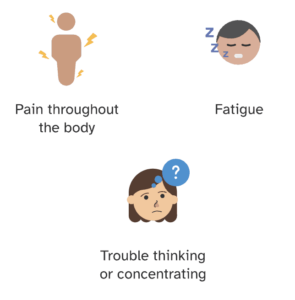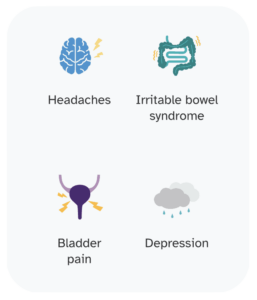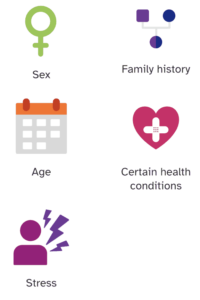Is Fibromyalgia Genetic?Explore Fibromyalgia and what your DNA can tell you
What is fibromyalgia?
Fibromyalgia is a condition characterized by chronic pain and tenderness throughout the body that lasts at least three months. Pain caused by fibromyalgia can come and go and can move around the body. Other symptoms can include moderate to extreme fatigue, poor sleep quality, and trouble thinking or concentrating. Although the cause of fibromyalgia is not fully understood, scientists think that people with the condition may be more sensitive to pain due to processing differences in the nervous system, especially in the brain and spinal cord.

How can fibromyalgia impact your health?
Although chronic pain, fatigue, and other fibromyalgia symptoms can make day-to-day life a challenge, fibromyalgia is not life-threatening. However, people with fibromyalgia may experience other pain conditions including headaches (migraine or tension), irritable bowel syndrome (IBS), or a painful bladder (called “interstitial cystitis”).
Because fibromyalgia can cause chronic pain and discomfort, it can also impact mental health. Individuals with fibromyalgia may experience feelings of depression or anxiety. Counseling and/or support groups can be an important part of some fibromyalgia management plans.

Is fibromyalgia genetic?
Genetics do play a role in fibromyalgia. This means some people may be more likely to develop fibromyalgia than others, depending on their genetics. Fibromyalgia can run in families, which means that a person has an increased chance of developing fibromyalgia if family members have fibromyalgia. In most cases, it is a combination of many different genetic variants that impact a person’s chances of developing fibromyalgia. Individually, each of these variants only has a small impact on a person’s genetic likelihood, but that impact can grow when many variants are considered together. 23andMe takes into account 13,040 genetic markers to estimate the likelihood of developing fibromyalgia, but keep in mind that other factors besides genetics can also influence a person’s overall likelihood of developing this condition.
Other factors that may cause an increased likelihood of fibromyalgia
It is estimated that 2-4% of the U.S. population has fibromyalgia, although it is thought to be underdiagnosed, especially among males. Besides genetics, some factors that can increase a person’s chances of developing fibromyalgia include:
• Sex (females are more likely to be diagnosed with fibromyalgia than males)
• Family history of fibromyalgia
• Age (fibromyalgia is most commonly diagnosed between ages 20-55, and becomes more common as people get older)
• Certain health conditions (including depression, viral infections, arthritis, and lupus)
• Stress (including periods of prolonged stress and physically or emotionally traumatic events, such as car accidents)

Find out if your genetics might increase your likelihood of developing fibromyalgia
Curious whether you have an increased likelihood of developing fibromyalgia based on your genetics? Find out more with the Fibromyalgia report (Powered by 23andMe Research), part of the 23andMe+ Premium membership. 23andMe+ Premium includes our Health + Ancestry Service plus new premium reports and features throughout the year.

23andMe+ Premium
Please note:
- This report does not diagnose fibromyalgia and should not be used to make medical decisions.
- The report was developed by 23andMe scientists using data and insights gathered from thousands of customers who consent to participate in our research. Reports based on 23andMe research provide an estimate of your likelihood of developing a condition based on your genetics and other factors. This report does not account for lifestyle or family history.
- The report does not account for every possible genetic variant that could affect your likelihood of developing fibromyalgia.
References:
- Centers for Disease Control and Prevention. “Fibromyalgia.” Retrieved May 15, 2022 from https://www.cdc.gov/arthritis/basics/fibromyalgia.htm.
- Kia S et al. (2017). “Update on Treatment Guideline in Fibromyalgia Syndrome with Focus on Pharmacology.” Biomedicines. 5(2).
- Lorden L. “It’s a Guy Thing: Men with Fibromyalgia.” Retrieved May 15, 2022 from https://www.fmaware.org/its-a-guy-thing-men-with-fibromyalgia/.
- Macfarlane GJ et al. (2017). “EULAR revised recommendations for the management of fibromyalgia.” Ann Rheum Dis. 76(2):318-328.
- Maffei ME. (2020). “Fibromyalgia: Recent Advances in Diagnosis, Classification, Pharmacotherapy and Alternative Remedies.” Int J Mol Sci. 21(21).
- Mayo Clinic. “Fibromyalgia.” Retrieved May 15, 2022 from https://www.mayoclinic.org/diseases-conditions/fibromyalgia/symptoms-causes/syc-20354780.
- Muraleetharan D et al. (2018). “Understanding the Impact of Fibromyalgia on Men: Findings From a Nationwide Survey.” Am J Mens Health. 12(4):952-960.
- National Fibromyalgia Association. “Fibromyalgia.” Retrieved May 15, 2022 from https://www.fmaware.org/fibromyalgia/.
- National Institute of Arthritis and Musculoskeletal and Skin Diseases. “Fibromyalgia.” Retrieved May 15, 2022 from https://www.niams.nih.gov/health-topics/fibromyalgia.
- Siracusa R et al. (2021). “Fibromyalgia: Pathogenesis, Mechanisms, Diagnosis and Treatment Options Update.” Int J Mol Sci. 22(8).